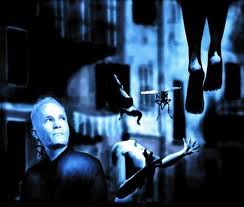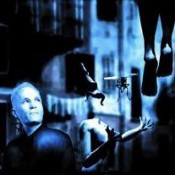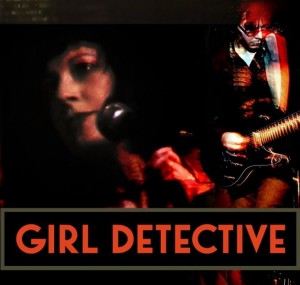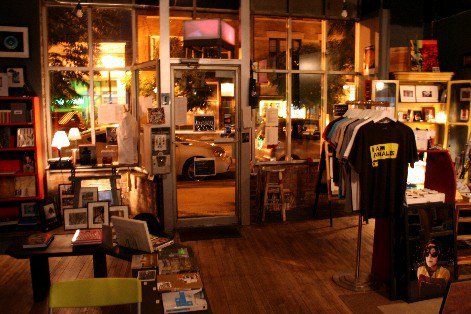
by Patrick Ogle
Attrition first set up shop in 1980 in Coventry, England. The end of that year saw the group’s first live incarnation. Attrition has gone through many line-up changes over the years and the music has changed stylistically—always electronic but sometimes dance, sometimes ambient.
One constant has been the man behind the band, Martin Bowes. In the early years the music was a sort of genre defying electronic post-punk. Early recordings such as This Death House followed shortly two years later by The Attrition of Reason set the tone for a career that is still producing innovative music. Resisting the temptation to catalog all of the band’s releases, all of the singles, 12-inch records and ephemera is difficult.
Bowes’ long career gives him not only decades of experience producing music , it spans the time period from when vinyl was king to the time when vinyl was “obsolete” and now back to a new relevance for the format.
Bowes has worked on his own albums but also with artists including; Psychic TV, Sol Invictus, Nick Cave, Marc Almond, AX, Sleep Research Facilty, and Merzbow. Bowes has remixed tracks for The Damage Manual, Mona Mur & En Esch. Die Form, In The Nursery and others.
Martin Bowes has recently opened his studio, The Cage, to the public and it would be an excellent studio choice for bands or projects looking to produce vinyl. If you cannot make it to Coventry, Bowes has some advice on recording for vinyl.
First off–you just opened your personal studio to the public. How did this come about? Tell us about the studio?
Martin Bowes: I had started building my studio back in the early 90’s as I knew it was going to be important to have control over the recording process… too many times we had spent far too little time in professional studios recording our music… I wanted time and control to make things sound how i wanted without watching the clock… so I started The Cage studios In 1993 for the recording of the Attrition album “The Hidden Agenda”… and everything since…
As a result of having this in a time when it was still quite rare for bands to have their own studio, I was invited to teach music technology at a local college here in Coventry, which I did for 16 years. I only ever had the time to use the studio for my own recordings with Attrition and for a few special projects I wanted to take on until last year when I finished teaching and decided it was time to open the doors of The Cage full time.
I upgraded the studio and had a whole new part of my house purpose built for this…it has quickly become very popular and I am lucky enough to be able to work on projects I believe in here.
If an artist came to you and said, “I am doing a recording that will, primarily, be released on vinyl,” what are the first things you think of with regard to the recording?
It is more the mixing and mastering where i will be making decisions in regards to vinyl. Let the initial recordings be as creative as possible and worry about technical issues regarding formats to the mix and master. The first thing I will ask is, “What kind of vinyl?” As opposed to CD formats there are many qualities of vinyl–seven-inch, 10-inch, 12-inch single, albums, and so on…all with varying capacity for playing back your music, and then the length of the material is going to affect it too…so there are a few things to consider.
And bear in mind that there will always be less dynamic range on vinyl as opposed to CD.
Beyond that, what are some other things artists should consider when recording for vinyl?
As I mentioned, formats are important….a bass-heavy dance tune is going to be best pressed on a 12-inch single where there will be room in the grooves to reproduce the bass end. And be careful about stereo sounds particularly on the bass end, and then some of the higher frequencies don’t always reproduce so well on turntables so you need to be extra careful of sibilance, etc.
These days, recordings are often released on vinyl and digital (skipping CDs). How to you bridge the gap, as a producer, between these formats that differ so radically?
Well, CD is only a high-end digital format and with transfer rates and storage capacity getting always higher then we are getting spared the low quality mp3s, etc. we had 10 years ago.
I don’t think it will be long before .wav files are the standard and .mp3’s are dropped into the trash can of history. (I was going to say dust bin). The formats differ but at the end of the day its the music that counts and it can be crafted for any format you like with some care.
You also hear vinyl releases that sound like shit. Usually this has to do with bad mastering or with NO mastering. Make the case for mastering your record with care.
It can be the mastering and it can also be a bad pressing… that’s not so rare either! So always get a test pressing when dealing with vinyl and always get another one if it gets messed up. But yes, of course all music for whatever format its aimed at does need to be mastered with care…and even more so with vinyl as it is more unforgiving than digital.
Now, specifically with regard to vinyl, how do you go about mastering a record?
I always give it a few listens to get the feel of the music and ask the artists what they are looking for as at the end of the day it’s their music, and everyone has a different idea of what they want.
Then I will get into details and examine frequencies, listening on different speaker systems including headphones…and if these are old recordings from tapes etc., I will first clean them up with de-noising tools, etc.
Then, depending on what needs doing, start getting the EQ tools and compression/limiting in place…but only if it’s needed. Sometimes as with mixing, less can be more effective than more. And a small EQ cut here and there may be so much better than lots of boosts. At the same time, I am also sorting out any vinyl issues such as the bass end and sibilant top end, etc. Once I have something I am happy with I get a test copy to the artist or label for their reaction and then make any adjustments if needed.
How can people in the USA get in touch re mastering or recording?
These days, I am dealing with artists from all over the world thanks to file transfers, so check out the studio page at www.thecagestudios.co.uk and just email me on martin@thecagestudios.co.uk if you are interested in me working with you on your project.
We can talk over what you need and what i can do for you. Attrition started in 1983 with vinyl releases and like a lot of people we have recently got back into the format…. releasing Demonstro a double vinyl LP of rarities last year… and have more planned for our latest album, The Unraveller Of Angels, due out this autumn. If anyone wants to check out the Attrition website please do at http://www.attrition.co.uk



